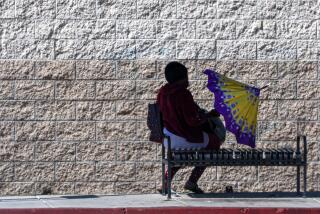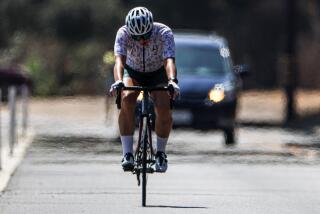Patients at 2 Hospitals Suffer in Sizzling Heat
- Share via
The fourth consecutive day of temperatures in the 100s was tough on almost everyone in Los Angeles on Friday, but probably no one had a harder time than the patients and employees at two local hospitals.
The thermometer peaked at 104 inside the cardiac care unit at the UCLA Medical Center on Friday afternoon after a cooling-tower fire Thursday night knocked out the air conditioning for the entire hospital. And, at Los Angeles County-USC Medical Center in Lincoln Heights, it was about 100 degrees Friday afternoon in some of the wards where there is no air conditioning.
Sarah Daniels, a secretary in the UCLA cardiac unit, said she resorted to fantasizing about a place she has never been just to get through the day.
“If I just keep thinking, ‘I’m in Tahiti. I’m in Tahiti,’ then this heat doesn’t bother me,” she said, gazing wistfully at two lemonade cartons she had already emptied.
The temperature climbed to 100 degrees at the Los Angeles Civic Center on Friday, six degrees cooler than the record high of Thursday and five degrees cooler than Wednesday’s mark. But it still broke the record for the date, set in 1962, by 12 degrees, and topped the average high temperature for an April 7 by 30 degrees.
Nights remained warm, too. The minimum reading at the Civic Center, recorded before dawn Friday, was 71 degrees, five degrees above the old record.
Pat Cooper, a meteorologist with WeatherData Inc, which provides forecasts for The Times, said the sizzling heat should last through the weekend.
“Saturday will be another hot one for much of the area,” she said. “It should be in the mid- to upper-90s downtown, but there could be some readings of 100 in the San Fernando and San Gabriel valleys and out to Ontario. Near the coast, there’ll be a cooling trend though, with highs in the 80s at most beaches.”
Cooper said some low clouds and fog should form along the coast tonight, and that will keep the beaches even cooler by Sunday, when readings in the 70s are expected. Farther inland, it should continue quite warm on Sunday, with highs in the 90s downtown and in the valleys.
Forecasters said the strong high-pressure systems that have been dominating the weather patterns over the western United States will begin breaking down late Sunday, bringing to an end the hot, dry, Santa Ana winds that have been parching the Southland.
“The real cooling trend won’t start until Monday, when we should be back to the 70s and 80s across most of the area,” Cooper said.
But that prospect was still three days away for Daniels, one of 4,500 employees who sweltered through the day Friday along with more than 450 patients at UCLA Medical Center. Although the air conditioning was working by noon, it took until nightfall to cool down the seven-story building.
Paramedic ambulance traffic was diverted to other hospitals until 3 p.m. Friday, and elective surgeries were postponed until today.
To help those who had to stay inside the hospital, the UCLA center’s staff used some creative methods.
Fans were placed in every room, and windows, which are normally closed, were opened.
‘We want to catch any breeze we can,” said Suzette Cardin, nurse manager in the cardiac unit.
Non-essential lights, computers and other electrical devices were turned off and the traditional medical uniforms, which tend to be on the warm side, were discarded in favor of cooler garb.
“Everyone is especially casual today,” Cardin said.
Patients were given cool baths and pitchers of ice water were placed at every bedside and work station. Brows were sponged with dampened towels.
“Most of the patients are just very lethargic . . . but we are not really concerned that their conditions will get worse,” Cardin said. “We’re just going to keep an extra close eye on them.”
For a time, hospital workers were worried about the cardiac unit’s computers, which are used to monitor patients’ heartbeats. Clinical engineer Ray Ford said the computers do not work above 94 degrees and the room temperature was 10 degrees above that.
To cool things down, he used fans blowing over buckets of ice. The makeshift cooling system worked. The computers kept on monitoring.
Volunteers such as Berthe Lyons roamed the UCLA center’s sauna-like hallways offering a cool drink to anyone in need. A cafeteria worker said ice cream was the best-selling item of the day. Hospital personnel were offered free lunches and all the juice and lemonade they could consume.
“It’s the least they could do,” said one nurse, who asked not to be identified. “It’s miserable. I can hardly breathe.”
Patients scheduled to be discharged left unusually early, said nursing manager Veronique Rouillard. “They were in a rush to get out of here,” she said.
Across town at County-USC Medical Center, fans were moved from offices to patient wards, especially those on the south side of the hospital, where the sun bakes the outer walls during the day. Like their counterparts at UCLA, the 1,440 patients at County-USC were given cooling baths and swabbed with damp towels, and nurses made sure everyone had plenty of cool water to drink.
Meanwhile, at a high school in Claremont, some students staged a walkout to protest the heat and lack of air conditioning in their classrooms.
“It was steaming in there,” said Josh Crowe, a ninth-grade student at Claremont High. “When the bell rang at 12:40, we decided not to go back to class.”
Principal Nancy Krause said some of them “came in and asked me to declare a minimum day”--a shortened schedule which would have closed the school for the rest of the day.
“I told them I didn’t have the authority,” she said.
After meeting with the protesters--about 150 of the school’s 1,800 students--to discuss the problem, Krause said about half of the youngsters went home and the others returned to class.
Officials at about 20 schools in the Los Angeles Unified School District with limited or no air conditioning released students early Friday, according to district officials.
“It was simply too warm,” said Janet Petersen, office manager at San Jose Elementary School in Mission Hills, which sent children home an hour early. “I didn’t hear many students complaining, but the staff certainly felt it.”
District officials notified schools on Wednesday that they could release students early if the temperatures topped 95 degrees and parents were notified 24 hours in advance.
And if anyone was wondering, Friday’s moderate earthquake in Orange County was in no way related to the hot spell, according to scientists at the seismology laboratory at Caltech in Pasadena.
“Whenever there’s an unusual weather condition and an earthquake occurs, people associate it with the weather condition,” said Riley Geary, an analyst at the lab. “The weather had absolutely nothing to do with it.”
More to Read
Sign up for Essential California
The most important California stories and recommendations in your inbox every morning.
You may occasionally receive promotional content from the Los Angeles Times.













![Vista, California-Apri 2, 2025-Hours after undergoing dental surgery a 9-year-old girl was found unresponsive in her home, officials are investigating what caused her death. On March 18, Silvanna Moreno was placed under anesthesia for a dental surgery at Dreamtime Dentistry, a dental facility that "strive[s] to be the premier office for sedation dentistry in Vitsa, CA. (Google Maps)](https://ca-times.brightspotcdn.com/dims4/default/07a58b2/2147483647/strip/true/crop/2016x1344+29+0/resize/840x560!/quality/75/?url=https%3A%2F%2Fcalifornia-times-brightspot.s3.amazonaws.com%2F78%2Ffd%2F9bbf9b62489fa209f9c67df2e472%2Fla-me-dreamtime-dentist-01.jpg)